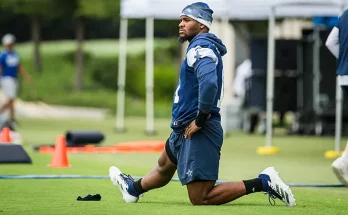In a college football era increasingly defined by the transfer portal and NIL deals, where patience is often eclipsed by personal opportunity, Alabama quarterback Ty Simpson has made a decision that has shocked many across the sport. Rather than follow the footsteps of countless backup quarterbacks before him, Simpson has chosen to stay with the Crimson Tide as Jalen Milroe’s backup, foregoing what could’ve been an easier path to a starting role elsewhere. His choice is one rooted in loyalty, long-term vision, and a deep belief in himself—and it may end up defining his career in ways no one anticipated.
For months, speculation swirled around Simpson’s future in Tuscaloosa. With Milroe emerging as Alabama’s clear-cut starter, the college football world assumed it was only a matter of time before Simpson entered his name into the transfer portal. After all, he was a former five-star recruit with starting-caliber talent who could have garnered interest from Power Five programs instantly. And in today’s climate, with quarterbacks frequently switching teams in pursuit of immediate playing time, the safe bet was on Simpson joining that trend.
But Simpson had other ideas.
“I came to Alabama to compete, to grow, and to win championships,” Simpson said in a recent interview. “I believe in Coach DeBoer’s vision, I believe in our quarterback room, and I believe my time will come. This program has given me everything. I’m not going to run from that just because the path isn’t easy.”
It’s a sentiment that harks back to an older era of college football—a time when players stuck with their teams, bided their time, and trusted the process. And in today’s win-now world, that mentality is not just rare—it’s almost revolutionary.
Simpson’s commitment is even more noteworthy when viewed in the context of Alabama’s quarterback lineage. From Jalen Hurts and Tua Tagovailoa to Mac Jones and Bryce Young, the Crimson Tide have fielded one elite quarterback after another, many of whom had to wait their turn. Jones, for instance, waited behind Tagovailoa and Hurts before leading Alabama to a national championship in 2020 and becoming a first-round NFL Draft pick. It’s a blueprint Simpson is well aware of.
“I’ve watched how guys like Mac Jones handled themselves,” Simpson said. “He could’ve transferred early in his career, but he didn’t. He stayed, learned, and when his moment came, he was ready. That’s how I see myself.”
Simpson’s decision isn’t just about loyalty; it’s also about faith in Alabama’s system under new head coach Kalen DeBoer. Known for his offensive ingenuity and quarterback development, DeBoer played a key role in Michael Penix Jr.’s rise at Washington and has quickly earned the trust of Alabama’s quarterback room. Simpson has reportedly embraced DeBoer’s vision wholeheartedly, recognizing that development under such a coach may be worth more in the long term than immediate playing time elsewhere.
The move has also made waves inside the Alabama locker room. Teammates and coaches alike have praised Simpson’s maturity and leadership despite being the No. 2 quarterback on the depth chart. Offensive coordinator Nick Sheridan noted, “Ty shows up every day with the mindset of a starter. He’s preparing like a pro, supporting his teammates, and pushing everyone to be better. That’s what you want in your program.”
Indeed, Simpson’s influence extends beyond what happens on game day. He’s taken on the role of a mentor to younger quarterbacks, helped in breaking down film, and has become a valuable voice in the offensive meeting room. In many ways, he’s become a culture carrier—a player who embodies the team-first mentality that championship programs are built on.
But make no mistake: Simpson’s staying isn’t about complacency. It’s about readiness. It’s about being prepared for when opportunity knocks—which, in college football, can happen in an instant. One injury, one game-changing moment, one chance, and a backup can become the face of the team. Simpson knows this. And he’s preparing for that exact moment.
“People forget how quickly things can change in football,” he said. “Look at what happened with Jalen Hurts and Tua, or even Bryce. You never know when your number’s going to be called. I want to be ready—not just to play, but to lead.”
This isn’t to say the decision was easy. Simpson admitted he had conversations with his family, mentors, and former coaches about entering the portal. He received inquiries from other programs, including some that reportedly guaranteed him a shot at the starting role. But in the end, the pull of Alabama, the chance to continue growing within the Tide’s system, and the belief in what’s being built under DeBoer won out.
“I won’t lie—it’s tempting when you hear schools want you, promise you playing time,” Simpson admitted. “But I’ve always been someone who values relationships, who values development. And there’s no place like Alabama when it comes to getting better and competing at the highest level.”
The larger implication of Simpson’s decision could mark a subtle but important shift in how we view the transfer portal era. While mobility and opportunity remain cornerstones of modern college football, Simpson’s loyalty offers a refreshing counterpoint: the idea that sometimes, the harder path—the path that requires patience, humility, and perseverance—can lead to even greater rewards.
It’s a stance that’s earning respect from fans and analysts alike. ESPN’s Kirk Herbstreit called Simpson’s choice “a rare example of character over comfort,” while former Tide quarterback Greg McElroy praised his commitment, saying, “Ty Simpson is the kind of player every coach wants. Talented, yes. But more importantly, he’s resilient, he’s loyal, and he’s all in. That means something.”
With another season set to begin and Milroe entrenched as the starter, Simpson understands that he may not see the field as often as he’d like. But that doesn’t mean he won’t have an impact. From pushing Milroe in practice to elevating the quarterback room, Simpson’s presence is a key piece of Alabama’s locker room chemistry.
And when his moment arrives—whether this year, next, or beyond—don’t be surprised if he’s more than ready.
“I’m here for the long haul,” Simpson said. “Not because it’s easy, but because I believe in this team, in this program, and in myself. My time will come. And when it does, I’ll be ready to lead Alabama just like all the greats before me.”
In a college football landscape driven by quick fixes and immediate gratification, Ty Simpson is playing the long game. And that might just make him the most important backup quarterback in America.



